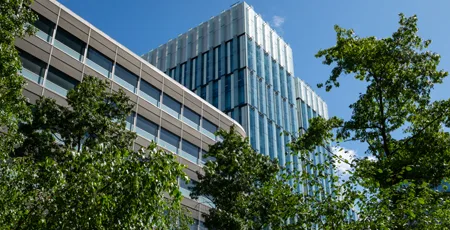Shaping Minds
New head of AMBS Professor Ken McPhail shares his vision for the School.
We are living in pivotal times and business schools need to respond to the challenge.
What are your priorities for the School?
We are living in pivotal times, whether it’s dealing with regional economic disparities, global geopolitical upheaval, climate change, or the impact of new technologies such as artificial intelligence. At the same time the age of win-win from globalisation and free markets is gone. For businesses today it is all about value generation and the alignment of social value, and if they don’t respond proactively to these responsibilities they undermine their social license to operate.
Businesses and policy makers are still getting to grips with this new model, so as a business school we need to ensure that our research addresses these pressing concerns and we help inform policy development. We need to equip our students and business leaders of tomorrow not only with the core business and economic knowledge to thrive, but encourage them to think differently to navigate these complex issues and challenges.
How can AMBS stand out in a competitive playing field?
It is important that we offer credible ways forward. We were one of the very first business schools that put social responsibility at its heart and have always swum slightly against the tide. That tide has now turned and everyone is swimming with us, so we have to look again at how we differentiate ourselves.
Being part of The University of Manchester gives us great advantages and we can leverage its huge scale, business engagement and impact opportunities. To respond to the challenges we have mentioned, learning from other disciplines is essential and we have a unique opportunity in terms of our inter-disciplinarity. If we can fully unlock that potential then we have a great opportunity to further understand the challenges that businesses face and offer solutions.
One of the keys to unlocking it is having academics at the frontier of their discipline engaging with other research areas. A good example would be academics working in fields such as AI and data science working closely with medicine and health in terms of developing new treatments.
Because of the University’s scale and size we can do these things, we have the academics, and we have the aspiration. But I’m also conscious that we need to get the balance right between challenge-led academia and curiosity driven research. We have to continue to create space for that curiosity and shouldn’t just be focused on ‘this is the challenge’ and ‘this is how we need to respond’.
Being part of The University of Manchester gives us great advantages and we can leverage its huge scale, business engagement and impact opportunities.
Where do you see particular growth opportunities for the School?
I think our excellent work around innovation and entrepreneurship has been slightly below the radar in recent times. The Masood Entrepreneurship Centre (MEC) has a fantastic track record in terms of the success rate of its start-up ventures with our students. We need to be spinning out more companies that are models of new social enterprise that are engaging with and solving problems, while still making a profit.
I am really excited by the huge potential of our executive education offering, both in terms of our new range of open programmes and with our custom programmes that are busier than ever. Executive education is a crucial way for us to share our knowledge and help address business challenges.
Over the coming year I also want to see us further leverage our international connections, both through the further development of our international centres and through further growth of our global collaborations with universities and companies.
It’s another area where we have a real opportunity to differentiate ourselves. Some business schools and universities will simply look for peer institutions to work with in different countries, but that is not our model. I want us to use our academic understanding of actual business issues and the global business environment to leverage opportunities with companies and institutions. The University of Manchester’s bicentenary in 2024 also gives us a huge opportunity to engage with business further, both at home and abroad.
What has surprised you most being in the job so far?
Getting a better sense of the amazing standing of the School both at home and abroad has been really eye-opening, and I’ve been struck by the sheer number of people that want to collaborate with the School on so many different levels. This also applies to our global reach. I've just come back from visiting our Dubai centre where the esteem of the brand is exceptional.
It all adds to the huge sense of excitement I have about the opportunity I have been given, but also the huge responsibility in ensuring AMBS can fundamentally shift the dial in terms of responding to today’s business challenges.
Finally, given your own research background in the area of business, ethics and social responsibility, you seem an obvious person to be leading the School at this time?
It’s true that I have been working in this area for 30 years and during that time we have gone from being on the periphery to the mainstream. All the more reason why it’s hugely important that we now bring business with us and help set the policy agenda. There has never been such a ground-breaking time for AMBS to help shape the minds of tomorrow and explore how the future business community will evolve, while always remaining true to its pioneering spirit.





